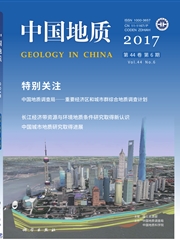

 中文摘要:
中文摘要:
在小兴安岭东南端的鹤岗-伊春市交界处大岭-带的晚石炭世弱片麻状中粒似斑状二长花岗岩中发育环斑结构长石,多以呈白形宽板状或宽板柱状的碱性长石内核和斜长石外薄壳组成.少量为不发育斜长石外壳的卵球状、球状、大小为1.5~3.5cm.其特征与典型的环斑结构在岩相学上是相同的。另外岩体中普遍发育暗色微细粒闪长质包体,与环斑钾长石在时空上紧密相伴;包体具典型的岩浆结构及针状磷灰石,含寄主岩的钾长石、石英巨晶:包体形态多呈浑圆的外形,显示出明显的塑性流变特点,与寄主岩常呈明显的接触关系.有时呈过渡状、雾迷状:以上充分说明了包体为岩浆混合成因(MME)。通过对岩体地质、环斑结构钾长石似斑晶、暗色微细粒闪长质包体等特征及岩体的岩石化学、地球化学研究表明大岭环斑花岗岩岩体为岩浆混合成因.产于造山环境.其形成时代、产出构造背景均不同于典型环斑花岗岩.
 英文摘要:
英文摘要:
Rapakivi-textured feldspars occur in Late Carboniferous weakly gneissic, medium-grained porphyaceous monzogranite in the Daling area between Hegang and Yichun cities at the southeastern end of the Xiao Hinggan Mountains. Most of them are idiomorphic and broad sheet-like or broad-prismatic in shape, and consist of an alkali feldspar core and a plagioclase mantle. Some are ovoid or globoid in shape without a plagioclase mantle and about 1.5-3.5 cm in size. Their petrographical features are comparable to those of the typical rapakivi granite. In addition, dark-colored microgranular dioritic enclaves are generally developed, and they have close relationship with rapakivi K-feldspars. The enclaves have typical textures of magma and acicular apatites and contain K-feldspar and quartz megacrysts of host rocks. The enclaves are mainly rounded in shape, showing pronounced plastic rheological characters. They usually have a clear-cut contact relationship with the host rocks and sometimes transition or foggy contacts could also be seen. The above-mentioned evidence fully shows that the enclaves are MME type enclaves. On the basis of the geological characteristics of the pluton, rapakivi-textured K-feldspar phenocrysts, dark-colored microgranular dioritic enclaves and petrochemistry and geochemistry, the Daling rapakivi granites were the product of magma mixing and formed in an orogenic environment, and their age and tectonic setting are different from those of typical rapakivi granites.
 同期刊论文项目
同期刊论文项目
 同项目期刊论文
同项目期刊论文
 期刊信息
期刊信息
